Structure de formation
Faculté des Sciences
Programme
Crystallography I
2 créditsThermodynamics and defects of solids M1
5 créditsInorganic materials
Surface properties M1
3 créditsCrystallography II and Electron Microscopy
6 créditsThin films and extreme conditions M1
3 créditsMaterials for catalysis M1
3 créditsQuantum Mechanics and Modelling I
5 crédits
Metallurgy and electronics properties
5 créditsInternship research
10 créditsProject internship
3 créditsQuantum Mechanics and Modelling II
7 créditsCrystallography, crystal chemistry, Large scale facilities
5 crédits
Crystallography I
Niveau d'étude
BAC +4
ECTS
2 crédits
Structure de formation
Faculté des Sciences
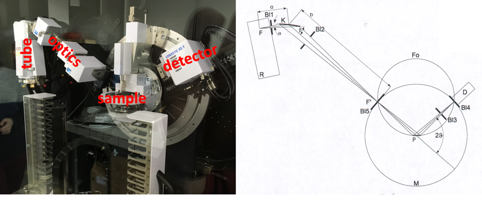
This lecture, entirely provided in English, gives a basic introduction into crystallography and electron diffraction for beginners. X-ray diffraction is an important characterization technique in modern chemistry the majority of crystalline structures in inorganic and organic solids have been solved by this method. It is therefore of importance for all students to have an understanding of its basic concepts and instrumentation. The course provides explanations and principles of X-ray diffraction together with the geometry and symmetry of X-ray patterns. Beside interaction principles of X-rays and matter, it treats how to obtain quantitative intensities for single crystal and powder diffraction patterns. It naturally includes the understanding of lattice planes and the reciprocal lattice concept together with the Ewald sphere construction. Further on it gives a basic understanding of the Fourier transform relation between the crystalline structure and the diffracted intensities as well as the reciprocal lattice concept.
Electron diffraction is a complementary technique to X-rays that provides information in terms of symmetry and geometry on the materials studied. In this course, we will therefore approach the description of the method for obtaining electron diffraction pattern and their interpretation. We will be able to obtain the lattice parameters, the reflection conditions as well as the groups of possible spaces.
This lecture serves also as the introductory part to the lecture Electron Microscopy and Crystallography II
CM :14
TD :6
Thermodynamics and defects of solids M1
Niveau d'étude
BAC +4
ECTS
5 crédits
Structure de formation
Faculté des Sciences
This module is devoted to deliver basic knowledge on the thermodynamics of defects. The understanding and basic concepts of defects in stoichiometric and non-stoichiometric solids is an important aspect to better understand and design materials for ionic and electronic conductivity with a specific relevance for energy materials. The lecture introduces and discusses the nature of point defects which intrude upon the perfect geometry of ideal crystal structures:
- Introduction into point defects (missing or misplaced atoms, ions or electrons)
- Discussion of thermodynamic concepts of order-disorder phenomena in solid solutions
- Understanding of Brouwer diagrams for oxides in order to emphasize the role of surrounding atmosphere onto the defect equilibrium at high temperature.
- Understanding of diffusion pathways and energies of ions and electrons, as a major consequence of point defects, giving rise to electrical transport is investigated for ionic conductors.
- Experimental investigations of measuring the ionic conductivity versus the temperature are described. The method of Impedance Spectroscopy Measurements is discussed.
- Presentation of the Kröger-Vink Notation of defects
- Mott-Hubbard insulators
Volumes horaires* :
CM : 24
TD : 12
Inorganic materials
Niveau d'étude
BAC +4
Structure de formation
Faculté des Sciences
This module will be divided into 3 parts:
- General introduction: main classes of materials, relation properties-structure of materials
- Construction and interpretation of phase diagrams: binary (e.g. with metallic and ceramic alloys)
- Construction and interpretation of ternary phase diagrams: variance, ternary eutectic definitions, first and second order peritectic, isothermal section, study of alloy cooling.
Volumes horaires* :
CM : 17h
TD : 8h
Surface properties M1
Niveau d'étude
BAC +4
ECTS
3 crédits
Structure de formation
Faculté des Sciences
This course provides a comprehensive knowledge and tools that relate to surface properties and interfacial behaviour of crystalline and amorphous solids in different media. It contains two parts: (1) Fundamentals of Colloid and Surface Science, divided and porous solids
(2) Surface characterisation techniques and surface analysis
Volumes horaires* :
CM : 17 h
TD : 8 h
Crystallography II and Electron Microscopy
Niveau d'étude
BAC +4
ECTS
6 crédits
Structure de formation
Faculté des Sciences
The structural characterization of Materials is a mandatory prerequisite to develop functional materials and an absolute must for materials science researchers and engineers. For the interpretation of diffraction patterns, structures, microstructures etc., a detailed knowledge in crystallography, structure analysis but equally of the instruments used is necessary. The necessary knowledge is developed from the scratch, progressively yielding an understanding on how to characterize materials by standard and sophisticated diffraction methods. The lecture also includes lab work on powder and single crystal diffractometers, allowing to acquire the competencies to correctly use and interpret diffraction data. The lecture during the 1st semester involves essentially X-ray diffraction as well as electron microscopy, while the crystallography part continues during the 2nd semester with symmetry, structure solution and structure refinements as well as neutron scattering and magnetic structure analysis.
This lecture contains 2 parts:
(1): Crystallography: Simple inorganic structures: basics & concepts, Fractional atomic coordinates and projections, Bravais lattices, Crystal systems, Lattice points, lines and planes, Miller indices, Zone equation, Wulff net, orienting matrix, Crystal growth and morphology, X-ray sources, interaction of X-rays, electrons and neutrons with matter, scattering lengths, structure factor, systematic extinctions, Debye-Waller factor, principles of scattering, reciprocal lattice, concept of Ewald sphere, Laue diffraction, Debye Scherrer camera, powder diffractometers, single crystal diffractometers, monochromators, detectors, resolution, stereographic projection, peak intensities, reflection profile broadening and grain size,
(2): Electron microscopy:
In this part, we will be interested in electron microscopy through flipped classes. We will discuss the following topics: Electron sources, lens and aberrations, sample preparation, electron diffraction, Structural and chemical analysis, Imaging techniques.
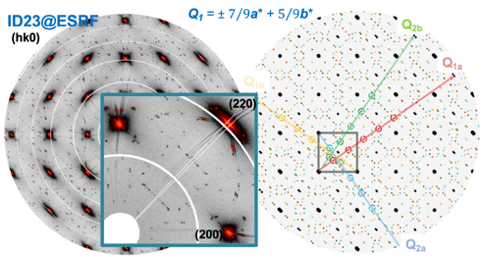
Volumes horaires* :
CM : 34
TD :18
Thin films and extreme conditions M1
Niveau d'étude
BAC +4
ECTS
3 crédits
Structure de formation
Faculté des Sciences
This course consists of a series of different lectures in the field of synthesis and characterization of thin films for technological applications or academic research. It is completed by an introduction into synthesis techniques of compounds stabilized under high pressure or only available under special conditions.
- Physics of Low-dimensional systems
- Quantum confinement
- Quantum Wells, 1D Quantum-wire, 0D Quantum dots
- Electron confinement and Density of States (DoS) formalism
- Epitaxial films
- Microstructure
- Dislocations and grain boundaries
- Coatings and applications
- Diffusion barriers
- Photo optical devices
- Vacuum technology
- High pressure synthesis
Synthesis of compounds with unusual valence and coordination states
Volumes horaires* :
CM : 17
TD : 8
Materials for catalysis M1
Niveau d'étude
BAC +4
ECTS
3 crédits
Structure de formation
Faculté des Sciences
Thermodynamic and kinetic bases to understand the optimal conditions for catalytic reactions and the requirement of activity and accessibility of catalysts.
Methods for the preparation of porous and dispersed catalysts by nucleation-growth, aggregation and templating mechanisms.
Correlations between structural properties and activity of heterogeneous catalysts.
Examples of applications of heterogeneous catalysts to processes of refining and industrial chemistry.
Further on basic concepts of photocatalysis and electrocatalysis are explored
Volumes horaires* :
CM : 17 h
TD : 8 h
Quantum Mechanics and Modelling I
Niveau d'étude
BAC +4
ECTS
5 crédits
Structure de formation
Faculté des Sciences
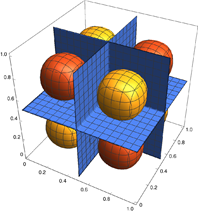
Wavefunction of an excited electron trapped in a cubic box: model for a quantum dot state
- Introduction to basic concepts in quantum physics and its relation to chemistry, modern materials science and engineering of nanodevices.
- To achieve the goals of this course, a mathematically-rigorous approach is combined with the physical interpretation of the concepts, and the application of the most important QM models to electronic and magnetic spectroscopies and chemistry is illustrated.
Volumes horaires* :
CM (Lectures) : 24H
TD (Tutorials) : 12H
Metallurgy and electronics properties
Niveau d'étude
BAC +4
ECTS
5 crédits
Structure de formation
Faculté des Sciences
This teaching unit is devoted to give an introduction to the electronic properties in the solid state of bulk and/or nano-materials, magnetic properties in transition metal oxides, etc…. This unit is given by different, alternating external teachers to UM and the topics may vary with respect to the respective area of expertise of the teaching stuff.
Students should get familiarized not only with the electronic properties and ordering of materials, but also with respect to ionic and mixed electronic ionic conductors, materials for spintronics. Another aspect concerns here their specific characterizations using neutron/synchrotron diffraction as well as complementary macroscopic characterization methods for magnetism, permeability, etc
Volumes horaires* :
CM : 30 h
TD : 15 h
Internship research
Niveau d'étude
BAC +4
ECTS
10 crédits
Structure de formation
Faculté des Sciences
This module is devoted to an internship of 3 months minimum in a research laboratory or industry.
Project internship
Niveau d'étude
BAC +4
ECTS
3 crédits
Structure de formation
Faculté des Sciences
Preparation of the 3 months research internship, exploring the state of art of the project, preparing optimum experimental conditions, and to present it in front of a jury.
Quantum Mechanics and Modelling II
Niveau d'étude
BAC +4
ECTS
7 crédits
Structure de formation
Faculté des Sciences
In this course a complete description of the structural, electronic and vibrational properties of molecules is given together with the quantum treatment of these properties in computer simulations.
In parallel the structural and electronic properties of solids is addressed with an emphasis on the properties of metals and semiconductors.
Volumes horaires* :
CM : 42H
TD : 21H
Crystallography, crystal chemistry, Large scale facilities
Niveau d'étude
BAC +4
ECTS
5 crédits
Structure de formation
Faculté des Sciences
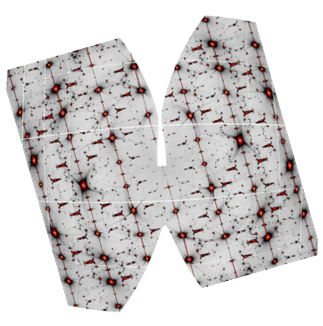
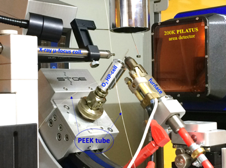
This lecture is the continuation of the crystallography lecture of the 1st semester and will give a advanced insight into structural characterization and structure refinements. It involves classical X-ray laboratory data collection and analysis, completed by synchrotron and neutron diffraction data analysis (powder and single crystal). The goal is to get familiar with the general principles of structure analysis, tanking advantage of the complementarity of X-ray and neutron diffraction. The lecture provides a detailed knowledge on how to understand and analyze phase transitions and how to deal with respective changes in the metric and associated data and structural transformations.
This lecture contains the following topics:
- Symmetry and space groups
- Introduction into structure refinement (single crystal and powder methods)
- Neutron and synchrotron facilities
- Magnetic structures with neutron diffraction
- Structure determination from single crystals (experiment and theory)
- Structure determination from powder diffraction data (experiment and theory)
- The applications of Fourier series for structure solution and refinements: from the Patterson Method to difference Fourier analysis
- Crystal twinning,
- Phase transitions
- Anomalous scattering and absolute structure determination
Volumes horaires* :
CM : 30
TD :15


